David C. Atkins
Leveraging Open Data and Task Augmentation to Automated Behavioral Coding of Psychotherapy Conversations in Low-Resource Scenarios
Oct 25, 2022Abstract:In psychotherapy interactions, the quality of a session is assessed by codifying the communicative behaviors of participants during the conversation through manual observation and annotation. Developing computational approaches for automated behavioral coding can reduce the burden on human coders and facilitate the objective evaluation of the intervention. In the real world, however, implementing such algorithms is associated with data sparsity challenges since privacy concerns lead to limited available in-domain data. In this paper, we leverage a publicly available conversation-based dataset and transfer knowledge to the low-resource behavioral coding task by performing an intermediate language model training via meta-learning. We introduce a task augmentation method to produce a large number of "analogy tasks" - tasks similar to the target one - and demonstrate that the proposed framework predicts target behaviors more accurately than all the other baseline models.
Human-AI Collaboration Enables More Empathic Conversations in Text-based Peer-to-Peer Mental Health Support
Mar 28, 2022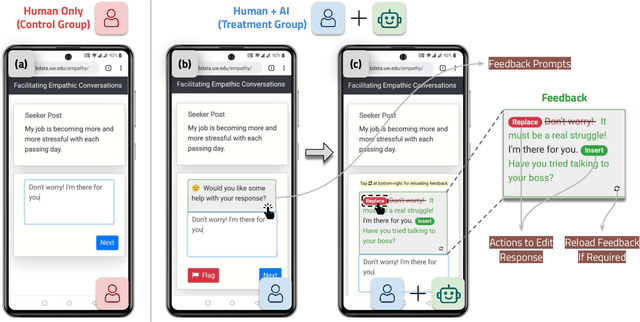
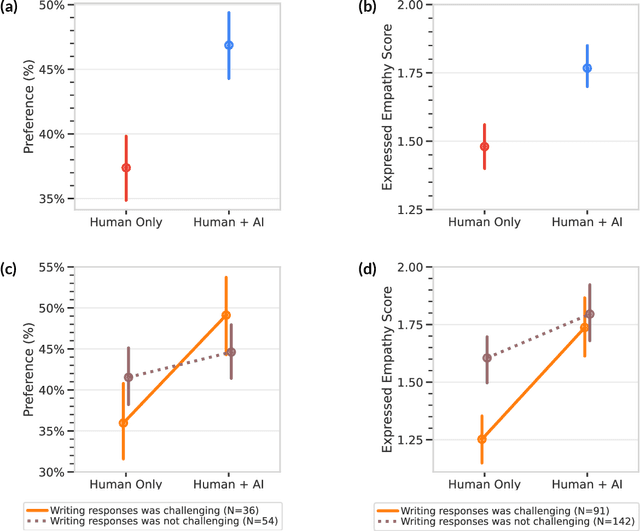
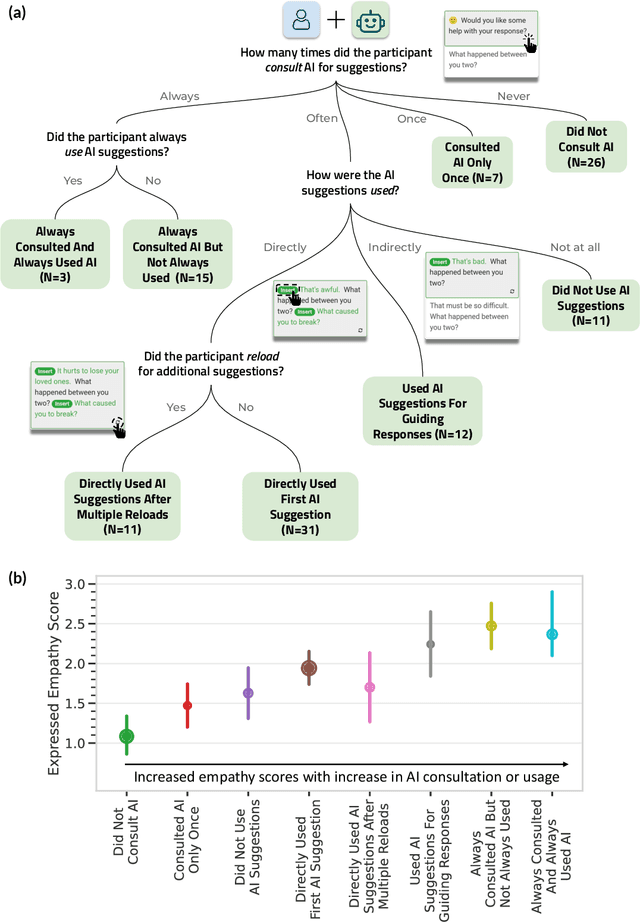
Abstract:Advances in artificial intelligence (AI) are enabling systems that augment and collaborate with humans to perform simple, mechanistic tasks like scheduling meetings and grammar-checking text. However, such Human-AI collaboration poses challenges for more complex, creative tasks, such as carrying out empathic conversations, due to difficulties of AI systems in understanding complex human emotions and the open-ended nature of these tasks. Here, we focus on peer-to-peer mental health support, a setting in which empathy is critical for success, and examine how AI can collaborate with humans to facilitate peer empathy during textual, online supportive conversations. We develop Hailey, an AI-in-the-loop agent that provides just-in-time feedback to help participants who provide support (peer supporters) respond more empathically to those seeking help (support seekers). We evaluate Hailey in a non-clinical randomized controlled trial with real-world peer supporters on TalkLife (N=300), a large online peer-to-peer support platform. We show that our Human-AI collaboration approach leads to a 19.60% increase in conversational empathy between peers overall. Furthermore, we find a larger 38.88% increase in empathy within the subsample of peer supporters who self-identify as experiencing difficulty providing support. We systematically analyze the Human-AI collaboration patterns and find that peer supporters are able to use the AI feedback both directly and indirectly without becoming overly reliant on AI while reporting improved self-efficacy post-feedback. Our findings demonstrate the potential of feedback-driven, AI-in-the-loop writing systems to empower humans in open-ended, social, creative tasks such as empathic conversations.
An Automated Quality Evaluation Framework of Psychotherapy Conversations with Local Quality Estimates
Jun 15, 2021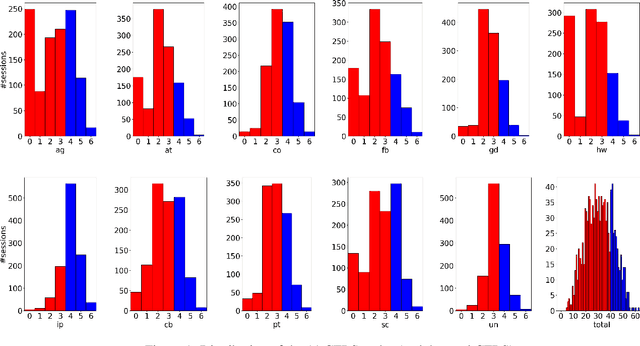



Abstract:Computational approaches for assessing the quality of conversation-based psychotherapy, such as Cognitive Behavioral Therapy (CBT) and Motivational Interviewing (MI), have been developed recently to support quality assurance and clinical training. However, due to the long session lengths and limited modeling resources, computational methods largely rely on frequency-based lexical features or distribution of dialogue acts. In this work, we propose a hierarchical framework to automatically evaluate the quality of a CBT interaction. We divide each psychotherapy session into conversation segments and input those into a BERT-based model to produce segment embeddings. We first fine-tune BERT for predicting segment-level (local) quality scores and then use segment embeddings as lower-level input to a Bidirectional LSTM-based neural network to predict session-level (global) quality estimates. In particular, the segment-level quality scores are initialized with the session-level scores and we model the global quality as a function of the local quality scores to achieve the accurate segment-level quality estimates. These estimated segment-level scores benefit theBERT fine-tuning and in learning better segment embeddings. We evaluate the proposed framework on data drawn from real-world CBT clinical session recordings to predict multiple session-level behavior codes. The results indicate that our approach leads to improved evaluation accuracy for most codes in both regression and classification tasks.
Automated Quality Assessment of Cognitive Behavioral Therapy Sessions Through Highly Contextualized Language Representations
Feb 23, 2021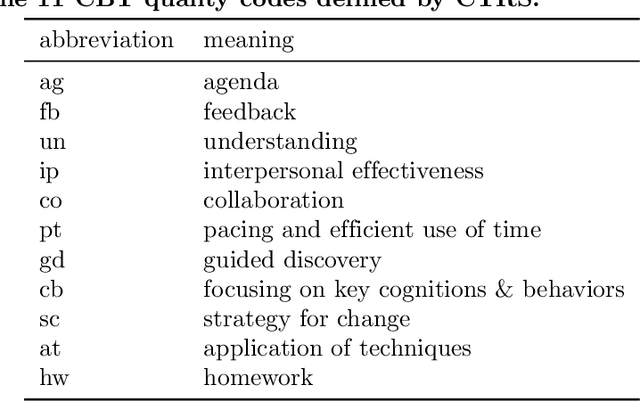


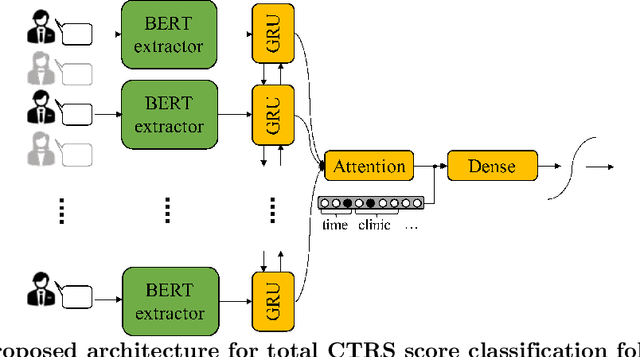
Abstract:During a psychotherapy session, the counselor typically adopts techniques which are codified along specific dimensions (e.g., 'displays warmth and confidence', or 'attempts to set up collaboration') to facilitate the evaluation of the session. Those constructs, traditionally scored by trained human raters, reflect the complex nature of psychotherapy and highly depend on the context of the interaction. Recent advances in deep contextualized language models offer an avenue for accurate in-domain linguistic representations which can lead to robust recognition and scoring of such psychotherapy-relevant behavioral constructs, and support quality assurance and supervision. In this work, a BERT-based model is proposed for automatic behavioral scoring of a specific type of psychotherapy, called Cognitive Behavioral Therapy (CBT), where prior work is limited to frequency-based language features and/or short text excerpts which do not capture the unique elements involved in a spontaneous long conversational interaction. The model is trained in a multi-task manner in order to achieve higher interpretability. BERT-based representations are further augmented with available therapy metadata, providing relevant non-linguistic context and leading to consistent performance improvements.
"Am I A Good Therapist?" Automated Evaluation Of Psychotherapy Skills Using Speech And Language Technologies
Feb 22, 2021
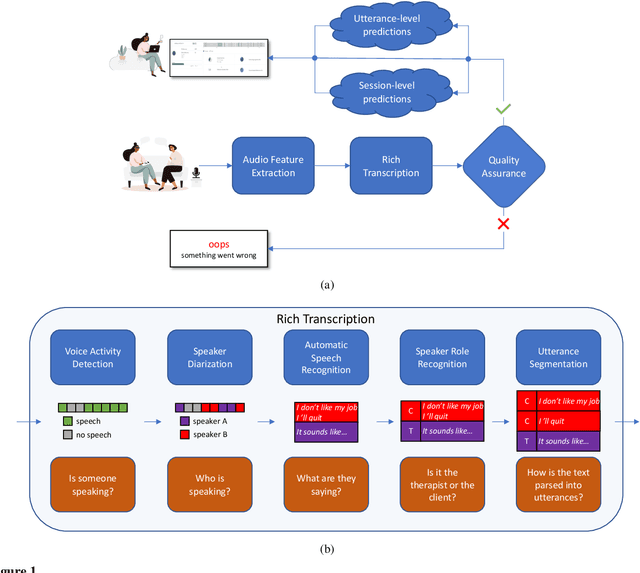
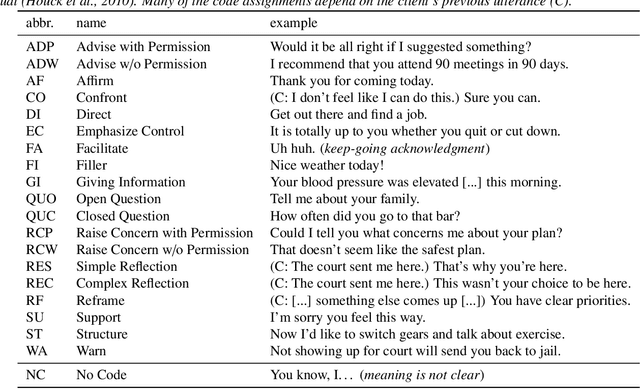
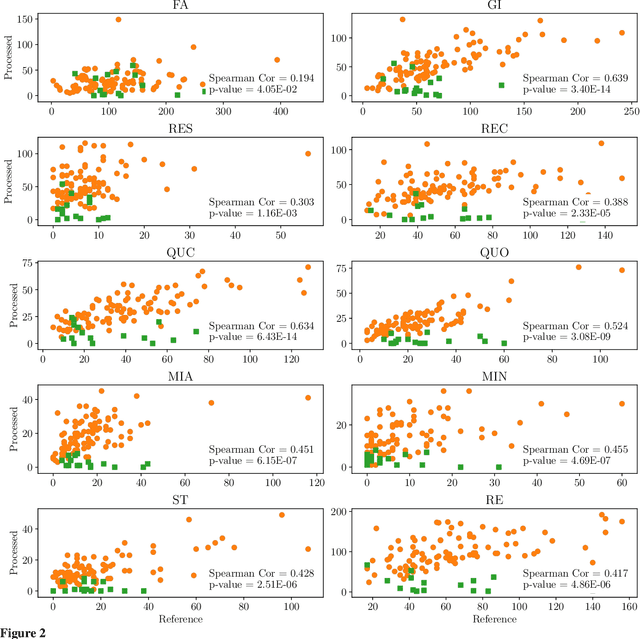
Abstract:With the growing prevalence of psychological interventions, it is vital to have measures which rate the effectiveness of psychological care, in order to assist in training, supervision, and quality assurance of services. Traditionally, quality assessment is addressed by human raters who evaluate recorded sessions along specific dimensions, often codified through constructs relevant to the approach and domain. This is however a cost-prohibitive and time-consuming method which leads to poor feasibility and limited use in real-world settings. To facilitate this process, we have developed an automated competency rating tool able to process the raw recorded audio of a session, analyzing who spoke when, what they said, and how the health professional used language to provide therapy. Focusing on a use case of a specific type of psychotherapy called Motivational Interviewing, our system gives comprehensive feedback to the therapist, including information about the dynamics of the session (e.g., therapist's vs. client's talking time), low-level psychological language descriptors (e.g., type of questions asked), as well as other high-level behavioral constructs (e.g., the extent to which the therapist understands the clients' perspective). We describe our platform and its performance, using a dataset of more than 5,000 recordings drawn from its deployment in a real-world clinical setting used to assist training of new therapists. We are confident that a widespread use of automated psychotherapy rating tools in the near future will augment experts' capabilities by providing an avenue for more effective training and skill improvement and will eventually lead to more positive clinical outcomes.
Towards Facilitating Empathic Conversations in Online Mental Health Support: A Reinforcement Learning Approach
Jan 19, 2021



Abstract:Online peer-to-peer support platforms enable conversations between millions of people who seek and provide mental health support. If successful, web-based mental health conversations could improve access to treatment and reduce the global disease burden. Psychologists have repeatedly demonstrated that empathy, the ability to understand and feel the emotions and experiences of others, is a key component leading to positive outcomes in supportive conversations. However, recent studies have shown that highly empathic conversations are rare in online mental health platforms. In this paper, we work towards improving empathy in online mental health support conversations. We introduce a new task of empathic rewriting which aims to transform low-empathy conversational posts to higher empathy. Learning such transformations is challenging and requires a deep understanding of empathy while maintaining conversation quality through text fluency and specificity to the conversational context. Here we propose PARTNER, a deep reinforcement learning agent that learns to make sentence-level edits to posts in order to increase the expressed level of empathy while maintaining conversation quality. Our RL agent leverages a policy network, based on a transformer language model adapted from GPT-2, which performs the dual task of generating candidate empathic sentences and adding those sentences at appropriate positions. During training, we reward transformations that increase empathy in posts while maintaining text fluency, context specificity and diversity. Through a combination of automatic and human evaluation, we demonstrate that PARTNER successfully generates more empathic, specific, and diverse responses and outperforms NLP methods from related tasks like style transfer and empathic dialogue generation. Our work has direct implications for facilitating empathic conversations on web-based platforms.
A Computational Approach to Understanding Empathy Expressed in Text-Based Mental Health Support
Sep 17, 2020



Abstract:Empathy is critical to successful mental health support. Empathy measurement has predominantly occurred in synchronous, face-to-face settings, and may not translate to asynchronous, text-based contexts. Because millions of people use text-based platforms for mental health support, understanding empathy in these contexts is crucial. In this work, we present a computational approach to understanding how empathy is expressed in online mental health platforms. We develop a novel unifying theoretically-grounded framework for characterizing the communication of empathy in text-based conversations. We collect and share a corpus of 10k (post, response) pairs annotated using this empathy framework with supporting evidence for annotations (rationales). We develop a multi-task RoBERTa-based bi-encoder model for identifying empathy in conversations and extracting rationales underlying its predictions. Experiments demonstrate that our approach can effectively identify empathic conversations. We further apply this model to analyze 235k mental health interactions and show that users do not self-learn empathy over time, revealing opportunities for empathy training and feedback.
Feature Fusion Strategies for End-to-End Evaluation of Cognitive Behavior Therapy Sessions
May 15, 2020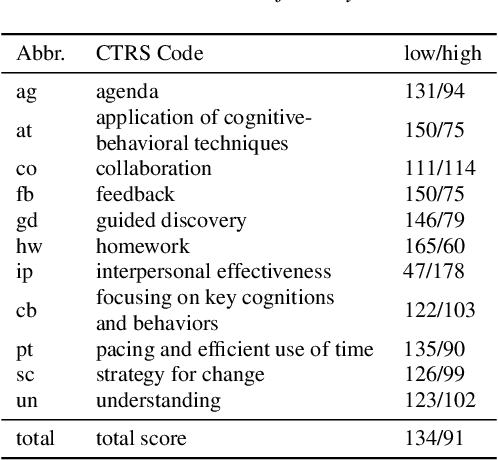
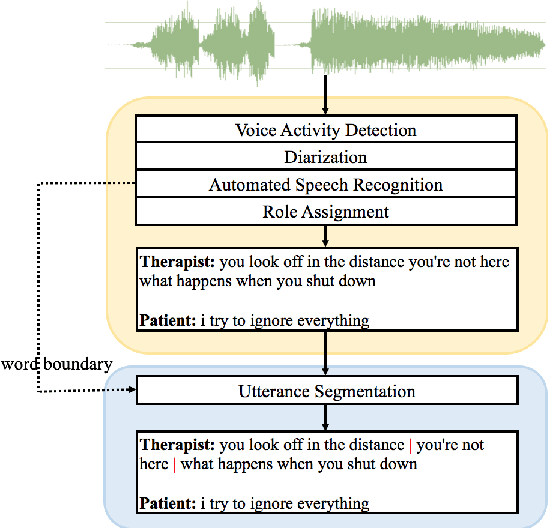
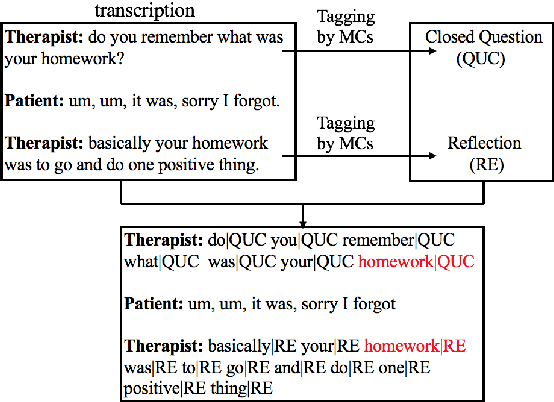
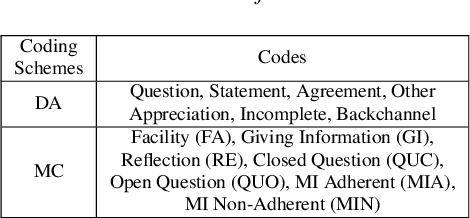
Abstract:Cognitive Behavioral Therapy (CBT) is a goal-oriented psychotherapy for mental health concerns implemented in a conversational setting with broad empirical support for its effectiveness across a range of presenting problems and client populations. The quality of a CBT session is typically assessed by trained human raters who manually assign pre-defined session-level behavioral codes. In this paper, we develop an end-to-end pipeline that converts speech audio to diarized and transcribed text and extracts linguistic features to code the CBT sessions automatically. We investigate both word-level and utterance-level features and propose feature fusion strategies to combine them. The utterance level features include dialog act tags as well as behavioral codes drawn from another well-known talk psychotherapy called Motivational Interviewing (MI). We propose a novel method to augment the word-based features with the utterance level tags for subsequent CBT code estimation. Experiments show that our new fusion strategy outperforms all the studied features, both when used individually and when fused by direct concatenation. We also find that incorporating a sentence segmentation module can further improve the overall system given the preponderance of multi-utterance conversational turns in CBT sessions.
A Label Proportions Estimation Technique for Adversarial Domain Adaptation in Text Classification
Mar 26, 2020



Abstract:Many text classification tasks are domain-dependent, and various domain adaptation approaches have been proposed to predict unlabeled data in a new domain. Domain-adversarial neural networks (DANN) and their variants have been used widely recently and have achieved promising results for this problem. However, most of these approaches assume that the label proportions of the source and target domains are similar, which rarely holds in most real-world scenarios. Sometimes the label shift can be large and the DANN fails to learn domain-invariant features. In this study, we focus on unsupervised domain adaptation of text classification with label shift and introduce a domain adversarial network with label proportions estimation (DAN-LPE) framework. The DAN-LPE simultaneously trains a domain adversarial net and processes label proportions estimation by the confusion of the source domain and the predictions of the target domain. Experiments show the DAN-LPE achieves a good estimate of the target label distributions and reduces the label shift to improve the classification performance.
Observing Dialogue in Therapy: Categorizing and Forecasting Behavioral Codes
Jun 30, 2019



Abstract:Automatically analyzing dialogue can help understand and guide behavior in domains such as counseling, where interactions are largely mediated by conversation. In this paper, we study modeling behavioral codes used to asses a psychotherapy treatment style called Motivational Interviewing (MI), which is effective for addressing substance abuse and related problems. Specifically, we address the problem of providing real-time guidance to therapists with a dialogue observer that (1) categorizes therapist and client MI behavioral codes and, (2) forecasts codes for upcoming utterances to help guide the conversation and potentially alert the therapist. For both tasks, we define neural network models that build upon recent successes in dialogue modeling. Our experiments demonstrate that our models can outperform several baselines for both tasks. We also report the results of a careful analysis that reveals the impact of the various network design tradeoffs for modeling therapy dialogue.
 Add to Chrome
Add to Chrome Add to Firefox
Add to Firefox Add to Edge
Add to Edge